Movie review: ‘A Thousand Words’
- Share via
The problem with Eddie Murphy? It is not a problem of talent or fearlessness. He has plenty of both. But in “A Thousand Words,” shot in 2008 and now available for your viewing displeasure, he’s a first-rate talent stuck in yet another third-rate piece of bleccch, written by Steve Koren, who shoveled us the Adam Sandler leavings “Click” and “Jack and Jill,” and directed by frequent Murphy collaborator Brian Robbins, whose résumé includes “Norbit” and “Meet Dave.”
This film is squarely in the quality league of those four gems, although its product placement (“This coffee is incredible!” Murphy says at one point, holding up a cup that says STARBUCKS) is so galling you wait for the punch line. One that never arrives.
In “A Thousand Words” the camera stays about 2 inches from Murphy’s hyperactive face, and you start to see the strain and desperation in the actor’s eyes. Without saying a word, those reaction shots — the film is a 100-minute reaction shot unto itself — says: I am in trouble here, yet I remain a big bad wolf of comedy. I will huff and puff and get a laugh. Somehow.
Murphy’s character is a variation on the tetchy monster (arrogant, egotistical, a disinterested family man) Sandler favors in his comedies. When the high-powered literary agent Jack McCall (Murphy) pursues the publishing rights tied to a Deepak Chopra-like enlightenment guru (Cliff Curtis) and his potential bestseller, the guru sees through the motormouth’s blather. This man, he reasons, needs a comeuppance. McCall receives it, in the form of a suddenly sprouted Bodhi tree that sheds a leaf with every word McCall utters. When the leaves are gone, McCall will die. This isn’t a giving tree; it’s a taking tree.
In the vein of “Click,” which got into some ungodly life-affirming pathos in its protagonist’s redemption, this film features sequences in which McCall chases his younger self (seen in golden fields of grain) and learns to forgive the father who abandoned him and to comfort his Alzheimer’s-stricken mother (Ruby Dee).
The film’s notion of successful marriage is simple: Just let your wife (Kerry Washington, lovely and given nothing to play) live in the cozy house she wants, not the zillion-dollar Hollywood hilltop bachelor pad you’d prefer.
More to Read
The biggest entertainment stories
Get our big stories about Hollywood, film, television, music, arts, culture and more right in your inbox as soon as they publish.
You may occasionally receive promotional content from the Los Angeles Times.










